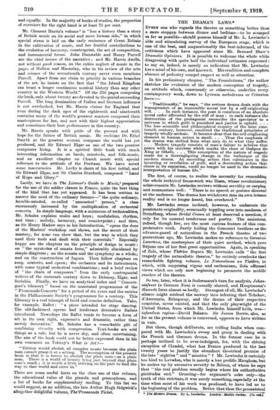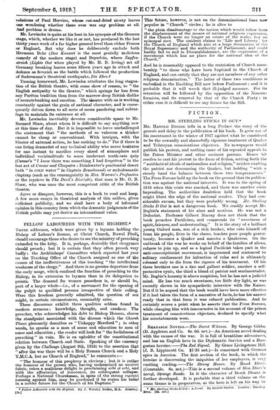THE DRAMA'S LAWS.* Evan one who regards the theatre as
something better than a more stopgap between dinner and bedtime—to be stamped as far as possible—should possess himself of Mr. L. Lewisohn's able and stimulating survey of the European stage, which is one of the best, and unquestionably the best-informed, of the criticisms which have appeared since Mr. Bernard Shaw's Dramatic Opinions. It is possible to welcome the whole while disagreeing with quite half the individual estimates expressed : to say so, indeed, is merely an indication that Mr. Lewisohn has a mind of his own, and knows it. His erudition and complete absence of pedantry compel respect as well as attention.
In his preliminary chapter, " The Foundations," the author sketches the evolution of the modern conception of tragedy, . an attitude which, consciously or otherwise, underlies every contemporary work, down to Lyceum melodrama or Criterion farce:— " Traditionally," he says, " the serious drama deals with the transgression of an immutable moral law by a self-originating will.. . . In each instance, the poet is conscious of an absolute moral order affronted by the will of man : in each instance the destruction of the protagonist reconciles the spectator to a universe in which guilt is punished and justice is upheld. . . . The free scientific and philosophical enquiry of the later nine- teenth century, however, rendered the traditional principles of tragedy wholly archaic. It became clear that the self-originating element in human action is small. . . . Thus the emphasis of the drama was shifted from what men do to what they suffer. . . . Modern tragedy consists of man's failure to achieve that peace with his universe which marks the close of Oedipus the .King or Othello. . . . This conception of the nature of tragedy made for a thoroughgoing change in the technique of the modern drama, An ascending action that culminates in the incurring or revelation of guilt, and a descending action that closes in its expiation, could ito longer be used in the dramatic interpretation of human life."
The first, of course, to realize the necessity for remoulding the whole technical framework was 'Ibsen, whose revolutionary achievements Mr. Lewisohn reviews without servility or carping, and summarizes well : " There is no speech or gesture directed at the audience. The drama has withdrawn into its own intense reality and is no longer heard, but overheard."
Mr. Lewisohn seems inclined, however, to underrate the passionate originality, eventually toppling over into madness, of Strindberg, whose Bridal Crown at least deserved a mention, if only for Its unusual tenderness and poetry. The omissions, indeed, though few, are the most curious feature of this com- prehensive work. Justly hailing the Goncourt brothers as the advance-guard of naturalism in the French theatre of two generations ago, Mr. Lewisohn makes no reference to Germinie Lacerteux, the masterpiece of their quiet method, which gave R6jane one of her first great opportunities. Again, in speaking of Zola, whose Therese Regain Mr. Lewisohn calls " the first tragedy of the naturalistic theatre," he entirely overlooks that remarkable fighting volume, Le Naturalism au Thedtre, in which, with surprising vigour and enthusiasm, Zola affirmed views which are only now beginning to permeate the middle reaches of the theatre.
So too, later, when it is Sudermann's turn for analysis, Johan- nisfeuer (a German Nan) is casually slurred, and Hauptmann's Hannele fares almost as badly. Strangest of all, Mr. Lewisohn's silence might mislead the unwary into inferring that Tchekov, d'Annunzio, Echegaray, and the drama of their respective countries, never existed, and that the only playwright of the United States, from which Mr. Lewisohn himself hails, was- infandum regina—David Belasco. Sir James Barrie, also, as far as the present volume is concerned, appears to have written
in vain.
But these, though deliberate, are trifling faults when com- pared with Mr. Lewisohn's sweep and grasp in dealing with the French and German drama. In the former case he is perhaps inclined to be over-indulgent, for, with the shining exception of Claude', what has France produced in the last twenty years to justify the abundant theatrical promise of the late " eighties " and " nineties " ? Mr. Lewisohn is certainly
too kind to Lavedan, who is merely a less prolific Maugham, but he makes up by excessive severity to Brieux, of whom he says
that "the real problem usually begins where his authoritative platitudes end." Granting—for argument's sake only—the truth of this stricture, it was surely something,.especially at the time when most of his work was produced, to have led us to the beginning of the problem. Better that than the geometrical
• The Modern Drams, By L. Lowbohn. London : Martin scats, Us. ne1.] solutions, of Paul Hervieu, whose cut-and-dried nicety leaves one wondering whether there ever was any problem at all. And problem is drama.
Mx. Lewisohn is quite at his best in his synopsis of the German stage, which, whether we like it or not, has produced in the last thirty years work of a far higher general level than either France or England. But why does he deliberately exclude both Hermann Bahr (Des Konzert is the most genially malicious comedy of the modern stage) and Beyerlein, whose Zagen- streich (Lights Out when played by Mr. H. B. Irving) set all Germany breaking lances some fifteen years ago in attack and defence as feverish as the battle which followed the production of Suderniann's theatrical earthquake, Die Ehre I
Turning homeward, Mr. Lewisohn attributes the long stagna- tion of the British theatre, with some show of reason, to " the English antipathy to the theatre," which springs far less from any Puritan tradition than from the marrow-deep British, dislike of mountebanking and emotion. The theatre with us is working constantly against the grain of national character, and is conse- quently driven down to all sorts of mean pandering and subter- fuge to maintain its existence at all.
Mr. Lewisohn inevitably devotes considerable space to Mr. Bernard Shaw, about whom it is difficult to say anything new at this time of day. But it is impossible to leave unehellenged the statement that " the methods of so valorous a thinker cannot be cheap or conventional. With intrigue, with the bluster of external action, he has nothing to do." For if there is one living dramatist of any technical ability who never hesitates for one instant to sacrifice every shred of atmosphere and individual verisimilitude to some irrelevant tenth-rate quip (Caesar's "I knew there was something I had forgotten" in the last act of Caesar and Cleopatra t Drinkwater's penitential desert bath " in COLD water " in Captain Brassbound) or melodramatic claptrap (such as the consanguinity in Mrs. Warren's Profession or the reprieve in The Devil's Disciple), that man is Mr. G. B. Shaw, who was once the most competent critic of the British theatre.
Agree or disagree, however, this is a book to read and keep. A few more essays in theatrical analysis of this calibre, given .sufficient publicity, and we shall have a body of informed opinion in this country from which the dramatic judgments.of the British public may yet derive an international value.



































 Previous page
Previous page